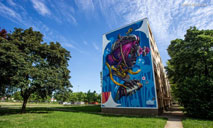Guangzhou tightens restrictions in response to mutant strains amid resurgence

Medical workers from Nanfang Hospital collect samples for nucleic acid tests in Liwan District of Guangzhou, south China's Guangdong Province, May 27, 2021. Liwan District of Guangzhou has carried out COVID-19 nucleic acid tests for all citizens from May 26 to 27. (Xinhua/Deng Hua)
Guangzhou, South China's Guangdong Province, has beefed up community and travel restrictions to prevent the spread of the coronavirus amid the latest COVID-19 resurgence. Local authorities have vowed to strengthen anti-epidemic measures to combat the more transmissible mutation, which was found to be from a strain detected in India.
The city reported 18 local COVID-19 confirmed cases on Monday, bringing the total to 23 since the outbreak started on May 21. It had also recorded seven asymptomatic patients as of the end of Sunday.
Guangzhou has stepped up nucleic acid testing, epidemiological investigation and the control of key personnel and areas, said Zhang Zhoubin, a deputy director of the Guangzhou Center for Disease Control and Prevention, at a press conference on Monday.
The mutant strain has seen rapid transmission, a short incubation period and a high viral load, with an average incubation period of two to four days, and a nucleic acid CT value of about 20, said Zhang.
Liwan district, the most affected area in Guangzhou, had sealed off five streets with 473 intersections as of Monday. People living in those streets are banned from going out and all public venues will be closed.
Besides, Guangzhou has assigned more than 300 teams of 13 branches for the epidemiological investigation.
The city will also suspend individual's and other social groups' appointments for COVID-19 vaccination from Monday to concentrate medical forces on further mass nucleic acid tests. As of 2 pm on Monday, a total of 3 million samples had been collected.
Feng Zijian, a deputy director of the Chinese Center for Disease Control and Prevention, pointed out the big challenges that mutant strains pose to China's anti-epidemic work on Monday, noting that epidemic prevention and control measures should be strengthened in terms of their intensity, scope and duration.
The State Council, China's cabinet, has dispatched a working group to Guangzhou to guide the local anti-epidemic work and "take the most rigorous measures" to cut off the transmission.
Li Ming, a deputy mayor of Guangzhou, said at the press conference that the transmission trajectory of the virus was basically delineated after rapid, intensive investigations.
Guangzhou imposed transportation restrictions to prevent the virus from spreading. Starting from 10 pm on Sunday, passengers leaving Guangzhou from airports, railway and highway stations were required to present negative nucleic acid test results within the previous 72 hours.
Due to the restrictions, most inbound and outbound flights at Guangzhou Baiyun International Airport, the world's busiest airport during the pandemic, were canceled on Monday.
As of 11:40 am, the airport had canceled 519 flights, accounting for 37.34 percent of the total. Among them, 300 were inbound, accounting for 40.7 percent of the total inbound flights, according to flight data services company Variflight.com.
Guangdong has been the province with the largest number of inbound visitors in China since the pandemic began, accounting for 90 percent of the country's inbound international arrivals every day.
In particular, Guangzhou's Baiyun International Airport handled 43.77 million passenger trips in 2020, becoming the busiest airport in the world for the year.
Photos
Related Stories
- Scholar: China prioritizes right to life in COVID-19 fight
- Scientists prepare rebuttal letter to Science on virus lab leak theory: insider
- China's State Council sends work team to guide Guangdong's COVID-19 response
- U.S. hindering global anti-epidemic cooperation a wicked deed
- COVID-19 easing in Bucharest, Romania
Copyright © 2021 People's Daily Online. All Rights Reserved.










